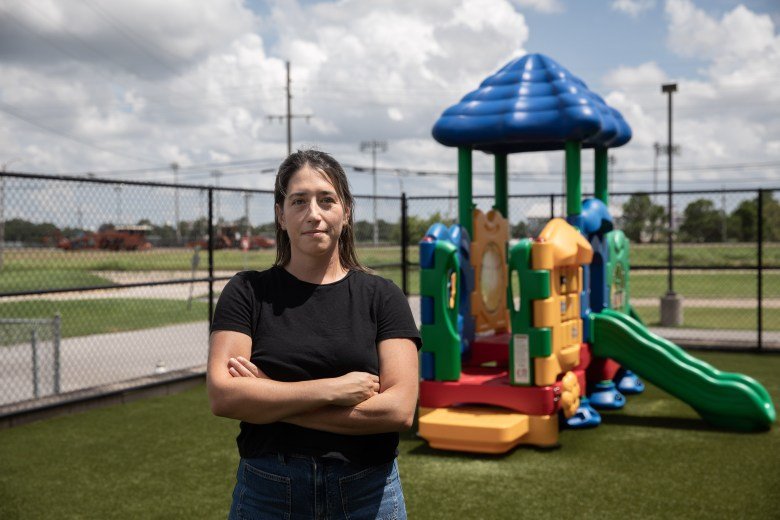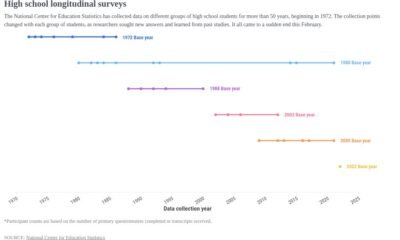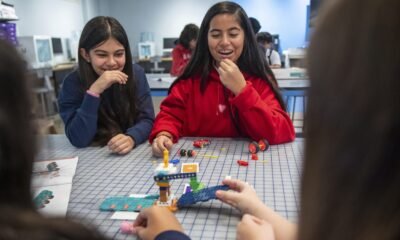Education
How no-strings cash changed the lives of teens

NEW ORLEANS — Kapri Clark used the $50 to help pay for her braces. Lyrik Grant saved half of it, and used the rest for dance classes. Kevin Jackson said he squandered the cash, on wings, ride shares for dates and some DJ equipment he later tossed.
For the past five years, Clark, Grant, Jackson and hundreds of high schoolers in New Orleans have shopped — or saved — as part of a project to explore what happens if you give cash directly to young people, no strings attached.
“That was the most helpful thing ever,” said Clark, now a student at the University of Louisiana at Lafayette, who said she could still use that extra cash.
“The $50 study,” as it’s known, began at Rooted School, a local charter school, as an experiment to increase attendance. The study has since grown to eight other high schools in the city, as well as Rooted’s sister campus in Indianapolis, with students randomly selected to receive $50 every week for 40 weeks, or $2,000 total. By comparing their spending and savings habits to a larger control group, researchers wanted to figure out whether the money improved a teen’s financial capability and perception of themselves. They also wanted to know: Could the cash boost their grade-point averages and reading scores?
Now, as the experiment expands to Washington, D.C., and perhaps Texas, a final report of the $50 study suggests a little bit of spending cash can make a difference in young people’s lives.
The report, released Tuesday, shows students who received the cash payments were slightly more likely to attend school than those who didn’t. Academic performance did not differ between the groups. But financially, the extra cash helped students acquire stronger long-term planning skills and familiarity with savings accounts and other financial products. They ended the study, on average, with $300 saved away — a 15 percent savings rate, triple the national average for American adults.
“When young people are given the opportunity to manage money in low-stakes environments, they build the habits that shape long-term financial health,” said Stacia West, an associate professor at the University of Tennessee, Knoxville and co-founder of the Center for Guaranteed Income Research, which partnered with the Rooted School Foundation to run the study. “The short-term habits we’re seeing are laying the foundation for lifelong financial capability.”
Related: A lot goes on in classrooms from kindergarten to high school. Keep up with our free weekly newsletter on K-12 education.
Across the United States and the globe, hundreds of communities have tinkered with some form of universal basic income, or UBI, a social welfare program that provides people with regular cash payments to meet their needs. Direct cash transfer programs like the $50 study or the child tax credit for families are similar, but they often provide smaller amounts and target specific populations to boost a person’s income. Many studies have linked UBI to financial stability and better employment and health outcomes.
In the U.S. and Canada, researchers have found links between cash transfer pilots that focus on low-income families and better test scores and graduation rates for their kids. So far, though, few experiments have targeted young people or examined how the programs influence their lives specifically.
“There’s a deep, deep distrust that we adults have of young people,” said Jonathan Johnson, CEO of the Rooted School Foundation, which operates the network’s four charter schools. “That distrust is to their detriment.”
In New Orleans, roughly 4 in 5 of Rooted students come from economically disadvantaged families, and during the pandemic, many struggled to prioritize school. Some students skipped class to provide child care for their working parents, or because they needed to work themselves, according to Johnson. With some seed funding from a local education nonprofit, Rooted started a “micropilot” to test whether cash could help students make ends meet and get themselves to school.
The original cohort included 20 students, half of whom received the $50 payment. In that micropilot, those receiving the cash saw their material wellbeing improve, meaning their family could more easily afford rent or utilities, and they gained skills around setting financial goals. Rooted added students from its Indianapolis campus and another high school in New Orleans, G.W. Carver. And for their final report released this week, researchers sifted through the spending and survey data from 170 students who received the cash payments and 210 students who did not.
The two-year report found students in the treatment group attended 1.23 more days of school, and spent close to half their funds on essentials like food and groceries. The report also noted that 70 percent of all students at the participating schools qualify for subsidized meals, suggesting “this spending may reflect efforts to meet immediate nutritional needs.” One 12th grader in a survey mentioned using the money to feed their siblings.
Kapri Clark recalled waiting every Wednesday morning for the $50 deposit to appear in her banking app. And every Wednesday afternoon, during her senior year at Carver High School, she put that money toward her $200 bill for braces she covered out of pocket.
She braided hair to cover the rest, and still books clients when she has time in between her studies to become a nurse at the Lafayette campus. Even in college, Clark can see the need for some supplemental income for herself and her peers.
“I make enough to take care of myself, but I watch every dollar,” said Clark. “There’s a lot of people struggling in life to eat, to live. Think if they got kids.”
Read Irvin, chief of staff for Collegiate Academies in New Orleans, a network of five charter high schools that includes Carver High, said the $2,000 had provided the extra incentive a few students needed to stick it out until graduation. “That’s incredibly impactful for their life trajectories,” she said.
Related: How to help young kids: Give their parents cash
In January 2024, the city of New Orleans invested $1 million to bankroll another extension of the study, as part of an economic mobility initiative that tapped federal Covid relief funding. During the pandemic, a skyrocketing murder rate and spike in overall crime had convinced the city to help more residents, especially young people, find stability.
“Research shows that people who are economically stable are less likely to commit crime,” said Courtney Wong, the city’s deputy director of economic development.
The city funding not only expanded the $50 study to nine high schools, it also set a longer timeline for the research: About 800 seniors who participate will have their data tracked for 18 months after their graduation.
A former high school teacher and administrator, Wong said $50 could have made a difference in the lives of many of her former students.
“This targets young people in that perfect moment,” she said. “They’re in the right spot where even a little amount of help could have big, positive impacts before issues of crime or unemployment or things like that even come up.”
Researchers also found students who received the $50 reported greater agency. They felt more control over their finances and more confidence about making long-term financial decisions. Students, according to the report, aligned their spending to future goals such as college prep classes and getting a driver’s license.
Lyrik Grant, a rising junior at Carver High School, is the second-youngest of six kids with two working parents. She could ask them for help, but the $50 allowed Grant to afford the tights and tops she needed for dance class on her own. The money helped cover a college entrance exam, which she aced, and Grant wants to learn how to drive soon.
“My first thought was: What am I going to do with all this money?” Grant said, adding that the cash helped some of her classmates find financial stability. “Children don’t always want to spend their parent’s money, and some parents don’t always have money to give them.”
Still, for some students, the money wasn’t exactly life-changing. Irvin of Collegiate Academies said many used the cash to “just be teenagers.”
That was true for Kevin Jackson, a rising junior at Rooted School New Orleans.
“It’s cool to get free money,” he said. “I was spending it on the TikTok shop: posters, keyboards, lights — stuff I liked, not stuff I actually needed.”
Related: All-charter no more: New Orleans opens its first traditional school in nearly two decades
Despite the studies that show a positive impact from UBI, many Americans appear skeptical of the idea of a federal program that gives unconditional financial support to people. Aditi Vasan, a pediatrician and researcher at PolicyLab at the Children’s Hospital of Philadelphia, said skeptics often worry about recipients using public dollars for drug use or other illicit behavior, even though the data does not support that.
Still, that fear will likely keep any large-scale cash transfer program from being adopted in the United States any time soon, she said.
“That concern exists certainly for cash transfers in general but might be particularly magnified for teens,” Vasan said. “We’ve not seen that play out in the evidence from the quality studies that have been done.”
Next year, in Washington, D.C., the nonprofit Education Forward will fund a pilot of the $50 study with 40 high schoolers. The Rooted school network resumed talks, meanwhile, to take the study to neighboring Texas, after state lawmakers earlier this year failed to pass legislation that threatened to ban local governments from adopting guaranteed income programs.
Talia Livneh, senior director of programs for the Rooted School Foundation, said the politics may need to catch up to the research.
“I don’t think what we’re doing is so radical. I believe this just works,” she said. “Kids don’t lack character. They lack cash,” Livneh added. “They deserve deep, deep trust that students and people know what’s best for them.”
It’s been four years since Vernell Cheneau III received the $50 for 40 weeks while a student at Rooted in New Orleans, and his economic life isn’t easy. He struggled for months to find part-time work in his hometown. But on a recent summer morning, the same day he finally received a job offer, Cheneau recalled what he learned from the study.
“You learn that money goes fast, especially if it’s free,” said Cheneau, 22.
As a student, he tried to use the money to build some credit history. Since then, he’s learned the full cost of being an adult in America: health care, fuel and maintenance for his car, getting your hair done before a new job. Cheneau has also spent that time trying to convince friends and family to support UBI.
Most oppose giving “free” money to people, he said. “How much does it cost to feed children? Get to work? We can’t just allow people to drown.”
“Everything costs something,” Cheneau added. “If you’re stuck in a rut, it’s expensive to restart. In this country, it’s expensive to be poor.”
Contact staff writer Neal Morton at 212-678-8247, on Signal at nealmorton.99, or via email at morton@hechingerreport.org.
This story about cash transfer programs was produced by The Hechinger Report, a nonprofit, independent news organization focused on inequality and innovation in education. Sign up for the Hechinger newsletter.
Education
President-elect of Oxford Union to face disciplinary proceedings for Charlie Kirk remarks | University of Oxford

The president-elect of the Oxford Union will face disciplinary proceedings for making “inappropriate remarks” celebrating the fatal shooting of Charlie Kirk, the union has announced on social media.
George Abaraonye, a student at the University of Oxford who became president-elect of the debating society after a vote in June, posted several comments in a WhatsApp group appearing to celebrate what happened, according to the Telegraph.
This included one saying: “Charlie Kirk got shot, let’s fucking go.” Another message, purportedly sent from Abaraonye’s Instagram account, read: “Charlie Kirk got shot loool.”
The Oxford Union said on Saturday that Abaraonye had suffered racial abuse and threats since his comments were revealed in the Telegraph on Thursday.
In a statement posted on social media on Saturday, the union reiterated that it had already condemned the president-elect’s “inappropriate remarks”. The society added: “We emphasise that these are his personal views and not those of the Union, nor do they represent the values of our institution.
“At the same time, we are deeply disturbed by and strongly condemn the racial abuse and threats that George has faced in response. No individual should ever be attacked because of the colour of their skin or the community they come from. Threats to his life are abhorrent. Such rhetoric has no place online, or anywhere in society.”
The statement went on to defend the right to free speech and freedom of expression, but added that free speech “cannot and will not come at the expense of violence, intimidation, or hate”.
“The Oxford Union does not possess executive powers to summarily dismiss a president-elect. However, the complaints filed against the president-elect have been forwarded for disciplinary proceedings and will be addressed with the utmost seriousness.
“Our duty is to demonstrate to our members, the university community, alumni, and the wider public, that disagreement must be expressed through debate and dialogue, not through abuse or threats. That is the tradition we uphold, and it is the standard we will continue to set.”
On Thursday, Abaraonye said he had “reacted impulsively” to the news of Kirk’s shooting, and that the comments were “quickly deleted” after news emerged of his death.
“Those words did not reflect my values,” Abaraonye added. “Nobody deserves to be the victim of political violence … I extend my condolences to his family and loved ones.
“At the same time, my reaction was shaped by the context of Mr Kirk’s own rhetoric – words that often dismissed or mocked the suffering of others. He described the deaths of American children from school shootings as an acceptable ‘cost’ of protecting gun rights. He justified the killing of civilians in Gaza, including women and children, by blaming them collectively for Hamas. He called for the retraction of the Civil Rights Act, and repeatedly spread harmful stereotypes about LGBTQ and trans communities. These were horrific and dehumanising statements.”
Kirk and Abaraonye had met during a debate on toxic masculinity held by the Oxford Union in May, the Telegraph reported. Donald Trump, the US president, paid tribute to Kirk as a “martyr for truth and freedom” after the shooting.
Valerie Amos, the master of University College, Oxford, said on Friday that no disciplinary action would be taken against Abaraonye by the college he attends.
Amos said: “Though Mr Abaraonye’s comments are abhorrent, they do not contravene the college’s policies on free speech, or any other relevant policy. Therefore, no disciplinary action will be taken.”
Education
‘It was personal, critical’: Bristol parents’ long battle over council Send services | Special educational needs

“I’ve realised how damaging the whole thing’s been because, you know, you can’t trust people,” Jen Smith says from her home in Bristol.
Smith is one of a number of parents of children with special education needs and disabilities (Send) who allege Bristol city council spied on them because of their online criticism of the local authority.
More than three years have passed since a leak of council correspondence containing personal details – including wedding photos – of parents of Send children, and the council has finally agreed to commission an independent investigation into the claims.
Smith and others – some of whom wish to remain unnamed – have called on the former Bristol mayor Marvin Rees – now Baron Rees of Easton – to give evidence to the investigation as they search for answers as to why they were monitored.
They want to know if the “social media spying scandal” as it is known in the city was linked the cutting of funding to the Bristol Parent Carers charity days after the allegations first surfaced.
Smith, who has a son and daughter who are autistic and has been battling for improved Send provision for years, became a member of Bristol Parent Carers in 2018 and assisted in running coffee mornings and support groups in the south of the city.
She would frequently post her frustrations with the Send system in the city on social media. “It wasn’t done in any capacity as being part of the forum,” she says.
“It was just that Send was so bad in Bristol we had to challenge it, because it was, it was just a mess.”
Her view was backed up by official reviews and reports at the time. A review into alternative learning provision commissioned by the council found a catalogue of failings, and a report by Ofsted and the Care Quality Commission found “significant areas of weakness in the local area’s practice”. “Parents and carers are overwhelmingly condemning of the Send system in Bristol because of the experiences they have had,” the regulators said.
A July 2022 article in the Bristolian, a self-proclaimed “scandal sheet”, published a leaked cache of emails and a spreadsheet of “combative” social media posts that showed officials in the council’s department for children, families and education department had collated examples of social media criticism by Smith and other parent carers.
One official says they are “working hard to uncover some concrete evidence” and lists a number of examples of social media posts, as well as revealing they had been trawling personal photos of some of the members of the parent carer forum.
In one line of the email, the official says: “External comms deduced this is [redacted] as image is the same as wedding photos on [redacted]’s personal Facebook site.”
In another email, an official refers to Smith’s “duplicity”.
She says: “It was personal, critical stuff … They were just so full of themselves. It’s almost like they had this little bubble where they thought they were really important.”
The council conducted an internal “fact finding” mission in August 2022, which found there had been no “systematic monitoring” of social media – an exercise that Smith and others called whitewash.
After a vote by its children and young people policy committee, however, the council announced last month that it would commission an independent investigation into the “historic monitoring of the social media accounts of parents and carers of Send children”.
Smith is critical of Rees, who was Labour mayor from 2016 to 2024 before the people of Bristol voted to abolish the mayoral system in favour of a committee system.
She found him “vitriolic toward Send parents”, alleging he had “a real issue with anybody speaking out whatsoever”. Rees has been contacted for comment.
after newsletter promotion
Kerry Bailes, who has been a Labour councillor in Bristol since 2021, believes she was among the parents monitored when one of her tweets appeared in a subject access request – a process for individuals to ask an organisation for a copy of their personal data.
Bailes, whose son has autism and campaigned for improved Send provision before the allegations of monitoring surfaced, said she had been shocked and baffled when she learned her tweet had appeared in some of the correspondence.
“It feels like a big betrayal,” she says. “It’s like being in an abusive relationship, that you’re reliant, you’re co-dependent on that service, or that person or that group of people, and it just feels like a huge betrayal, but you can’t leave them. Because what’s going to happen to the support for your child?”
Bailes said she took part in protests outside Bristol city hall to raise the profile of the crisis in Send provision in the city.
“We took snippets of that and we put it on social media,” she says. “Our aim was to help the council help themselves. At at the time, there were 250 children without a school placement, so we put bunting up with with one triangle for each child that was missing a school placement outside city hall.
“Prior to 2022 the parent carer forum wasn’t what it should have been. The council weren’t really working with them. We were trying to advocate for our children, advocate as an alliance. It just seemed to rub the council up the wrong way.”
Bailes dismissed the council’s subsequent internal investigation as “patting themselves on the back, saying everything’s legal and above board”.
A spokesperson for Bristol city council said: “The children and young people policy committee is committed to inclusion and transparency and has voted to conduct an independent review into historical social media use.
“The council is also progressing with its Send and inclusion strategy, which includes investment in educational psychology services, the development of an inclusion and outreach service, and is spending over £40m to create new specialist places for children over the coming five years.”
No timetable has been set for the independent investigation.
Education
Ukraine urges ethical use of AI in education

Deputy minister urges careful use of AI in schools, warning it must support education, not replace it.
AI can help build individual learning paths for Ukraine’s 3.5 million students, but its use must remain ethical, First Deputy Minister of Education and Science Yevhen Kudriavets has said.
Speaking to UNN, Kudriavets stressed that AI can analyse large volumes of information and help students acquire the knowledge they need more efficiently. He said AI could construct individual learning trajectories faster than teachers working manually.
He warned, however, that AI should not replace the educational process and that safeguards must be found to prevent misuse.
Kudriavets also said students in Ukraine should understand the reasons behind using AI, adding that it should be used to achieve knowledge rather than to obtain grades.
The deputy minister emphasised that technology itself is neutral, and how people choose to apply it determines whether it benefits education.
Would you like to learn more about AI, tech, and digital diplomacy? If so, ask our Diplo chatbot!
-

 Business2 weeks ago
Business2 weeks agoThe Guardian view on Trump and the Fed: independence is no substitute for accountability | Editorial
-
Tools & Platforms1 month ago
Building Trust in Military AI Starts with Opening the Black Box – War on the Rocks
-

 Ethics & Policy2 months ago
Ethics & Policy2 months agoSDAIA Supports Saudi Arabia’s Leadership in Shaping Global AI Ethics, Policy, and Research – وكالة الأنباء السعودية
-

 Events & Conferences4 months ago
Events & Conferences4 months agoJourney to 1000 models: Scaling Instagram’s recommendation system
-

 Jobs & Careers2 months ago
Jobs & Careers2 months agoMumbai-based Perplexity Alternative Has 60k+ Users Without Funding
-

 Podcasts & Talks2 months ago
Podcasts & Talks2 months agoHappy 4th of July! 🎆 Made with Veo 3 in Gemini
-

 Education2 months ago
Education2 months agoVEX Robotics launches AI-powered classroom robotics system
-

 Education2 months ago
Education2 months agoMacron says UK and France have duty to tackle illegal migration ‘with humanity, solidarity and firmness’ – UK politics live | Politics
-

 Podcasts & Talks2 months ago
Podcasts & Talks2 months agoOpenAI 🤝 @teamganassi
-

 Funding & Business2 months ago
Funding & Business2 months agoKayak and Expedia race to build AI travel agents that turn social posts into itineraries





















